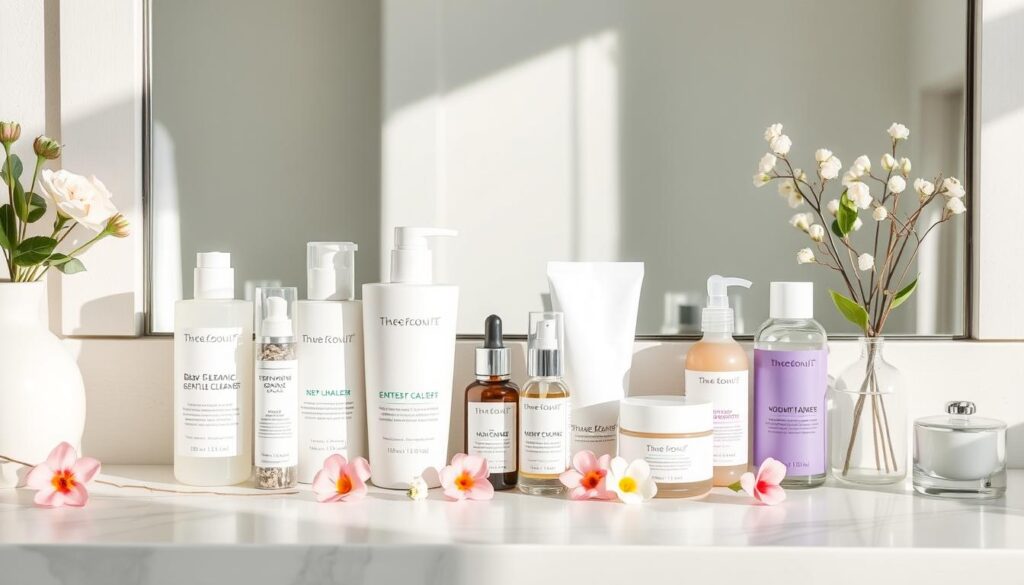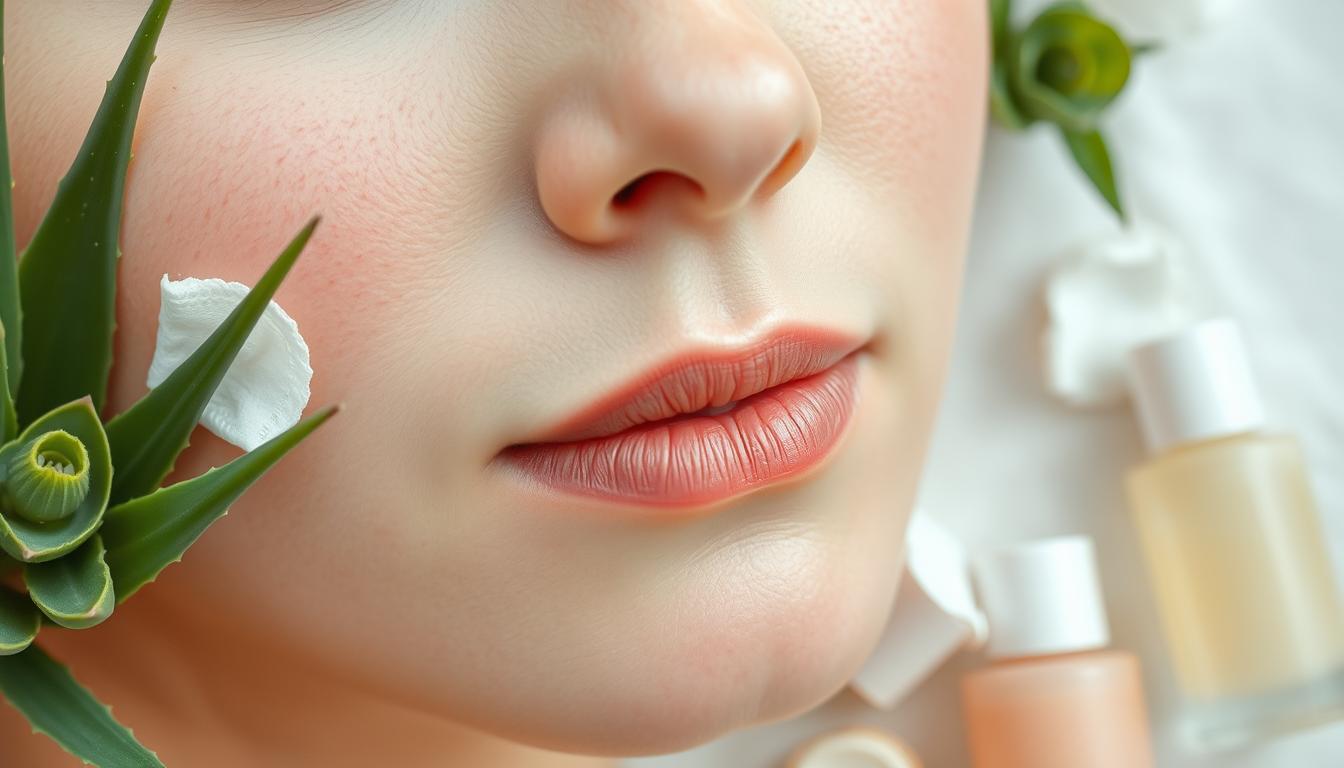If you have a sensitive complexion, navigating the world of skincare can feel daunting. Harsh ingredients, aggressive treatments, and environmental aggressors can leave your skin feeling irritated, red, and uncomfortable. But fret not – we’re here to guide you through the essential tips and practices to soothe, nourish, and protect your delicate skin. In this comprehensive guide, we’ll explore the causes of skin sensitivity, the importance of a gentle routine, and the best product formulations to keep your complexion calm and healthy.
Key Takeaways
- Understand the signs and triggers of sensitive skin to better manage your complexion.
- Adopt a gentle, non-irritating cleansing routine to maintain the skin’s protective barrier.
- Incorporate soothing, anti-inflammatory ingredients into your daily skincare regimen.
- Avoid common skincare mistakes that can exacerbate sensitivity and irritation.
- Work with your dermatologist to find the right products and treatments for your unique skin type.
Understanding Sensitive Skin: Signs and Symptoms
Navigating the complexities of sensitive skin can be a real challenge. Whether you’ve struggled with redness, irritation, or a persistent feeling of discomfort, it’s important to understand the underlying causes and how to effectively manage your skin’s needs. In this section, we’ll delve into the common triggers for skin sensitivity and explore the role of a healthy skin barrier function.
Common Triggers for Skin Sensitivity
Sensitive skin can be easily triggered by a variety of factors, including Sensitive Skin, environmental stressors, and certain skincare products. Some of the most common culprits include:
- Harsh detergents and fragrances
- Extreme temperatures, both hot and cold
- Prolonged sun exposure
- Certain ingredients like alcohol, retinoids, and alpha-hydroxy acids
- Stress and hormonal fluctuations
How to Identify Your Skin’s Sensitivity Level
Recognizing the signs of skin sensitivity is the first step towards finding the right solutions. Symptoms may include redness, itching, burning, dryness, and even breakouts. Dermatologist Recommended advice suggests paying close attention to how your skin reacts to various products and environmental factors to determine your unique sensitivity level.
The Role of Skin Barrier Function
At the core of maintaining healthy, Hypoallergenic skin is a strong, functional skin barrier. This protective layer helps retain moisture, shield against environmental aggressors, and prevent the penetration of irritants. When the skin barrier is compromised, it can lead to increased sensitivity, inflammation, and a host of other skin concerns.
By understanding the underlying causes and characteristics of sensitive skin, you can take the necessary steps to soothe, nourish, and strengthen your complexion for long-term skin health and a more confident, comfortable appearance.
Essential Gentle Cleansing Techniques for Delicate Skin
When it comes to caring for sensitive skin, the foundation of any effective skincare routine lies in our cleansing practices. Gentle Formulas and Fragrance-Free cleansers are essential for maintaining the Soothing balance of our delicate complexion. Let’s explore the key techniques that can help us achieve a healthy, radiant glow without irritating our skin.
One of the most important steps is to use lukewarm water when cleansing. Hot water can strip our skin of its natural oils, leading to dryness and inflammation. Instead, we should opt for a gentle, Fragrance-Free cleanser that’s formulated with Soothing ingredients to nourish and protect our skin barrier.
Avoiding over-cleansing is also crucial. While it may be tempting to scrub away impurities, excessive cleansing can do more harm than good. Instead, we should aim to cleanse our skin gently, using our fingertips or a soft, Fragrance-Free washcloth, and rinse thoroughly to remove any residue.
By incorporating these Gentle Formulas and Fragrance-Free techniques into our daily routine, we can ensure that our sensitive skin remains Soothing and nourished, setting the stage for a more effective and radiant complexion.
Sensitive Skin, Skincare Tips: Building Your Daily Routine
Creating a personalized skincare routine is essential for maintaining healthy, radiant skin – especially when dealing with sensitivity. By incorporating gentle, nourishing products and natural ingredients, you can build a regimen that caters to your unique skin needs. Let’s explore the steps to crafting a daily routine that will soothe and protect your sensitive complexion.
Morning Skincare Steps
Start your day with a gentle, non-foaming cleanser to remove impurities without stripping your skin’s natural moisture. Follow with a hydrating toner infused with calming botanicals to restore balance. Next, apply a lightweight, oil-free moisturizer containing natural ingredients like aloe vera or chamomile to moisturize and shield your skin. Don’t forget to finish with a broad-spectrum mineral sunscreen to protect against harmful UV rays.
Evening Skincare Protocol
- Cleanse with a soothing, creamy cleanser to gently remove makeup, dirt, and impurities.
- Spritz on a hydrating mist or facial essence to replenish moisture.
- Apply a nourishing serum with natural ingredients like vitamin C or hyaluronic acid to target specific skin concerns.
- Finish with a rich, creamy moisturizer to deeply hydrate and replenish your skin overnight.
Weekly Treatment Schedule
- Incorporate a gentle exfoliating mask once a week to slough off dead skin cells and unclog pores.
- Apply a soothing, calming face mask infused with natural ingredients like green tea or oatmeal to reduce redness and irritation.
- Indulge in a hydrating face oil or facial serum for an extra boost of nourishment.
Remember, the key to a successful routine for sensitive skin is to listen to your complexion and make adjustments as needed. With the right skincare tips and natural ingredients, you can achieve a radiant, moisturized glow.
Choosing Hypoallergenic Products: What to Look For
If you have sensitive skin, navigating the world of skincare can be daunting. With so many products on the market, how can you be sure you’re selecting ones that won’t cause irritation? The key lies in understanding the importance of hypoallergenic and fragrance-free formulas, as well as seeking out Dermatologist Recommended options.
Hypoallergenic products are designed to minimize the risk of allergic reactions by excluding common irritants like dyes, preservatives, and harsh chemicals. When scanning ingredient lists, look for claims like “fragrance-free” or “unscented” to ensure you’re avoiding potentially irritating perfumes and fragrances.
Dermatologists often recommend Hypoallergenic and Fragrance-Free products for those with sensitive skin, as they help support the skin’s natural barrier function and reduce the likelihood of inflammation or flare-ups. By choosing carefully, you can build a skincare routine that nourishes your complexion without triggering unwanted sensitivity.

When shopping for sensitive skin-friendly products, keep an eye out for these beneficial ingredients:
- Ceramides to reinforce the skin barrier
- Niacinamide to calm redness and irritation
- Glycerin to hydrate without stripping the skin
- Soothing botanical extracts like green tea or chamomile
By prioritizing Hypoallergenic, Fragrance-Free, and Dermatologist Recommended products, you can take the guesswork out of sensitive skin care and enjoy a complexion that’s healthy, balanced, and radiant.
Natural Ingredients That Soothe and Calm Irritation
When it comes to soothing and calming sensitive skin, the secret often lies in harnessing the power of nature. Several natural ingredients have been known for their anti-inflammatory and soothing properties, making them essential allies in the quest for healthier, more resilient complexions.
Anti-inflammatory Botanicals
From aloe vera to green tea, certain botanicals possess remarkable abilities to reduce redness and irritation. Aloe vera, for instance, is renowned for its cooling and hydrating effects, while green tea is rich in antioxidants that can help calm inflammation.
Protective Natural Oils
Nurturing the skin’s barrier is key for sensitive types, and natural oils can play a pivotal role in this process. Jojoba oil, rosehip seed oil, and argan oil are all renowned for their nourishing and soothing properties, helping to fortify the skin’s protective layer.
Healing Herbs and Extracts
From the soothing powers of chamomile to the anti-inflammatory benefits of turmeric, there is a wealth of natural ingredients that can provide relief for sensitive complexions. These potent botanical extracts can help calm irritation and restore balance to the skin.
By incorporating these natural, anti-inflammatory, and soothing ingredients into your skincare routine, you can unlock the secret to achieving a healthier, more resilient complexion. Embrace the power of nature and let your skin thrive.
The Impact of Environmental Factors on Sensitive Skin
When it comes to Sensitive Skin, environmental factors play a crucial role in maintaining its health and appearance. From the weather to pollution, various external elements can trigger irritation, inflammation, and discomfort for those with delicate complexions. Understanding how these factors influence Sensitive Skin is the first step towards implementing effective protection and care strategies.
One of the primary environmental stressors for Sensitive Skin is temperature fluctuations. Extreme heat or cold can disrupt the skin’s natural barrier function, leading to dryness, redness, and sensitivity. Anti-Inflammatory and Calming ingredients become essential in such conditions, helping to soothe and nourish the skin.
Pollution is another significant concern for Sensitive Skin. Airborne particulates, smoke, and chemicals can all contribute to inflammation, clogged pores, and irritation. Incorporating Sensitive Skin-friendly products with protective antioxidants can help shield the complexion from environmental aggressors.
Lifestyle choices, such as poor sleep, stress, and unhealthy dietary habits, can also impact the health of Sensitive Skin. Practicing self-care, maintaining a balanced lifestyle, and prioritizing skin-nourishing activities can all play a role in enhancing the resilience of the delicate complexion.
By understanding the impact of environmental factors and implementing proactive measures, individuals with Sensitive Skin can achieve a more resilient, Calming, and Anti-Inflammatory complexion, allowing them to confidently navigate various environmental conditions.

Dermatologist-Recommended Products and Brands
When it comes to sensitive skin care, the recommendations of dermatologists carry significant weight. These medical professionals have extensive expertise in skin health and can provide valuable insights into the most effective and gentle formulas. By focusing on Dermatologist Recommended, Gentle Formulas, and Hypoallergenic products, you can ensure your skin receives the specialized care it requires.
Prescription vs. Over-the-Counter Options
For individuals with highly reactive or severe skin sensitivity, dermatologists may prescribe specialized medications or treatments. These prescription-strength products are formulated with potent active ingredients that can provide targeted relief for specific skin concerns. On the other hand, over-the-counter options offer a more accessible and convenient way to address milder skin sensitivity, often featuring Gentle Formulas and Hypoallergenic ingredients.
Product Compatibility Guide
- Assess your skin’s unique needs and sensitivity level to ensure you choose the right products.
- Look for Dermatologist Recommended formulas that are specifically designed for sensitive skin types.
- Prioritize Gentle Formulas that avoid harsh chemicals, fragrances, and common irritants.
- Opt for Hypoallergenic products that are less likely to trigger adverse reactions.
- Introduce new products gradually and monitor your skin’s response to determine compatibility.
By following the guidance of dermatologists and selecting the appropriate Dermatologist Recommended, Gentle Formulas, and Hypoallergenic products, you can effectively address your sensitive skin concerns and maintain a healthy, radiant complexion.
Moisturizing Strategies for Reactive Skin Types
Keeping sensitive skin hydrated without triggering irritation can be a delicate balancing act. But with the right moisturizing techniques and natural ingredients, we can nourish and protect even the most reactive complexions. Let’s explore effective ways to maintain optimal moisture levels for sensitive skin types.
The key to moisturizing sensitive skin is to choose gentle, non-comedogenic formulas that avoid harsh chemicals and common irritants. Look for moisturizers infused with soothing natural ingredients like aloe vera, chamomile, and ceramides that strengthen the skin’s protective barrier.
When applying moisturizer, be mindful of your technique. Gently pat or press the product into the skin rather than rubbing vigorously, which can cause redness and inflammation. Incorporate hydrating facial mists and essences into your routine to provide an extra boost of moisture without overwhelming sensitive complexions.
Lastly, don’t forget to drink plenty of water and incorporate nourishing, moisturizing foods into your diet to support your skin’s overall health and hydration from the inside out.
By following these gentle moisturizing strategies and embracing natural ingredients, we can keep sensitive skin types hydrated and happy.
Common Skincare Mistakes to Avoid
When it comes to caring for sensitive skin, it’s essential to be mindful of the products and practices we use. Avoiding common skincare mistakes can make a significant difference in maintaining healthy, radiant skin. Let’s explore some key considerations to keep in mind.
Harmful Ingredients List
Steer clear of potentially irritating ingredients such as fragrance, alcohol, and harsh exfoliants. These can disrupt the skin’s delicate balance and lead to further irritation. Instead, opt for gentle, fragrance-free formulas that are tailored for sensitive skin types.
Product Application Errors
- Avoid over-exfoliating, as this can compromise the skin’s protective barrier.
- Be mindful of the order in which you apply your skincare products, ensuring that you start with the most gentle formulas and work your way up to the more active ones.
- Introduce new products gradually, allowing your skin to acclimate and adjust to any changes in your routine.
By being mindful of these common skincare tips and gentle formulas, you can safeguard your sensitive skin and enjoy a radiant, healthy complexion.
Conclusion
As we’ve explored, managing sensitive skin requires a gentle, consistent approach. By understanding the signs and symptoms of skin sensitivity, we can identify our unique triggers and take proactive steps to safeguard our complexion. Embracing gentle cleansing techniques, building a personalized skincare routine, and choosing hypoallergenic products infused with soothing natural ingredients are all essential for maintaining a healthy, radiant Sensitive Skin.
Throughout this guide, we’ve emphasized the importance of recognizing the role of skin barrier function and environmental factors in skin sensitivity. By fortifying our skin’s natural defenses and minimizing exposure to irritants, we can effectively reduce inflammation and prevent future flare-ups. Incorporating weekly treatments and staying vigilant about harmful ingredients can further enhance the resilience of our Sensitive Skin.
Ultimately, the path to achieving a glowing, comfortable complexion lies in honoring our individual skin needs and committing to a Skincare Tips regimen tailored to our unique requirements. By embracing gentle, Gentle Formulas and celebrating the beauty of our sensitive skin, we can cultivate a radiant, confident complexion that enhances our overall wellbeing.



